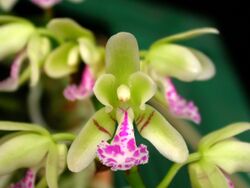Biology:Sedirea
| Sedirea | |
|---|---|

| |
| Sedirea japonica | |
| Scientific classification | |
| Kingdom: | Plantae
|
| (unranked): | |
| (unranked): | Monocots
|
| Order: | |
| Family: | |
| Subfamily: | |
| Tribe: | |
| Subtribe: | |
| Genus: | Sedirea
|
Sedirea is a genus of flowering plants from the orchid family, Orchidaceae. They are found in sub-tropical areas of China, Korea, and Japan, usually as epiphytes. The genus name is formed by spelling 'Aerides' backwards, a reference to the genus in which they were originally placed. The genus is abbreviated Sed.[1]
Taxonomy and naming
In 1974, Garay and Sweet erected the monotypic genus Sedirea for the species formerly known as Aerides japonica. This Japanese and Korean species differed from other Aerides species by having a long column and a short column foot. In 1982, Z.H. Tsi described Hygrochilus subparishii, a species from China in the Aeridinae. However, Hygrochilus species have a short, stout column and a lip with a small nectary reminiscent of Vanda section Vanda. The nectary is never developed into a spur in either Hygrochilus or Vandopsis s.s. Sedirea differs from Hygrochilus in having a diminutive habit, a long column, and an elongate spur. Thus, in 1985, Christenson moved H. subparishii into Sedirea. There are presently two known species:
- Sedirea japonica (H. G. Reichenbach) Garay & H. R. Sweet, Orchids S. Ryukyu Islands. 149. 1974.
Epiphytic on tree trunks in open forests or on cliffs along valleys; 600–1400 m. W Yunnan, Zhejiang, Japan (Southern areas to Ryukyu Islands), Korea (Jeollanam-do).
Chinese:萼脊兰 (e ji lan)
Korean: 나도붕난 (nadopungnan)
Japanese:ナゴラン or 名護蘭 (nago-ran)
- Sedirea subparishii (Z. H. Tsi) Christenson, Taxon. 34: 518. 1985.
Epiphytic on tree trunks in forests; 300–1100 m. N Fujian, N Guangdong, NE Guizhou, SW Hubei, Hunan, NE Sichuan, Zhejiang.
Chinese: 短茎萼脊兰 (duan jing e ji lan)
S. japonica has traditionally been very popular in the Asian horticultural trade, and recently has also been used in hybridizing.
See also
References
- ↑ Alphabetical List of Standard Abbreviations for Natural and Hybrid Generic Names, Royal Horticultural Society, 2017.
- Pridgeon, A.M., Cribb, P.J., Chase, M.A. & Rasmussen, F. eds. (1999). Genera Orchidacearum 1. Oxford Univ. Press.
- Pridgeon, A.M., Cribb, P.J., Chase, M.A. & Rasmussen, F. eds. (2001). Genera Orchidacearum 2. Oxford Univ. Press.
- Pridgeon, A.M., Cribb, P.J., Chase, M.A. & Rasmussen, F. eds. (2003). Genera Orchidacearum 3. Oxford Univ. Press
- Berg Pana, H. 2005. Handbuch der Orchideen-Namen. Dictionary of Orchid Names. Dizionario dei nomi delle orchidee. Ulmer, Stuttgart
Wikidata ☰ Q1601708 entry

